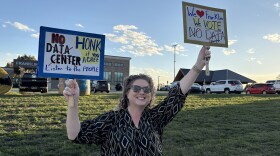As what’s expected to be a jam-packed legislative session in the Bluegrass State approaches, lawmakers on Kentucky’s Artificial Intelligence Task Force met Thursday to finalize their recommendations for the 2026 General Assembly.
The group – which convened for the first time in 2023 – has met monthly since the end of the 2025 legislation to learn about AI, its potential applications in government and its risks.
Republican Sen. Amanda Mays Bledsoe of Lexington, who co-chairs the task force, said the group’s been a valuable resource as Kentucky lawmakers develop a better understanding of AI and its implications moving forward.
“[It] has been a wonderful tool the last two years to educate members and figure out kind of where we want to go,” she said. “We're going to have to find a long term plan for this governance and opportunity.”
Since June, the lawmakers have heard about trends across the U.S. when it comes to legislating AI, the technology’s applications in education, the power demands of data centers and AI, how retailers use AI with regards to consumer data, AI’s impacts on mental and behavioral health and the potential use of AI to “enhance public safety” and combat criminal networks.
On Thursday, the task force ultimately made 10, as Bledsoe called them, “broadly worded” recommendations heading into the next legislative session for lawmakers to explore:
- Consider strengthening consumer protections around data collection
- Look into altering the acceptable use policies for AI in all state agencies
- Weigh legislative policies that promote collaboration between service providers, state agencies and state research universities for “the shared use and study of Medicaid data sets” so that Kentucky families can prevent certain diseases to result in lower Medicaid costs
- Acknowledge AI technology “may be harmful” to minors and consider legislative policies to protect minors on social media platforms
- Recognize that AI could impact careers regulated by professional standards and consider policies in coordination with professional standards boards regarding when and how it should be used in their profession
- Create or facilitate the formation of an AI work group to bring state and local governments, educational institutions, healthcare providers, industry and citizens together to identify needs, collect data, develop solutions, foster innovation and competitiveness, promote AI literacy and “ensure trusted artificial intelligence development and governance” for the state
- Incorporate AI development and governance into existing standing committees’ jurisdiction
- Consider legislative policies for the location of data centers in the state, including “minimum requirements for location and collaboration among local, state, and private entities”
- Consider policies regarding data centers’ needs for “large amounts of water and power” that will result in the state needing more baseload power to ensure grid sufficiency, including consultation with the Public Service Commission
- Encourage Kentucky’s federal delegation to work toward national policies for AI as it impacts state residents, including name, image and likeness property rights; consumer protection; data protection from retail companies and data-driven pricing; and small business economic issues “from a patchwork of state laws”
Moving forward, Verona Republican Sen. Gex Williams advocated for AI issues to be incorporated into the House and Senate’s standing Natural Resources & Energy committees. He said the “one-to-one relationship between data centers and energy” makes it a good fit, though he also acknowledged that AI’s relationship to governance could see it fall under the jurisdiction of other committees.
Sen. Reginald L. Thomas, a Lexington Democrat, hammered home the importance of protecting minors from being exploited by AI technology.
“We see every day here in America discussions of sexual exploitation of minors, sexual trafficking of minors. We know it occurs with a great deal of frequency, and AI is out there every day causing harm and danger to our children,” he said. “I do hope we take some action in the ‘26 legislative session to address this.”
Thomas also advocated for legislation to protect the state’s residents from potential rising power costs – and other environmental impacts – that could stem from data centers setting up shop in Kentucky.
‘When we build these data centers, it comes with increased power and, more importantly, increased costs,” he said. “I think if there's an increased cost that comes with data center construction, or use, then that data center should pay for that increased cost. Not the current consumers or the current business users who were using it before the data center came online.”
Mount Vernon GOP Rep. Josh Bray co-chairs the task force on AI. He said he expects lawmakers to bring forward legislation surrounding Thomas’ concern in the coming General Assembly.
The legislative session begins in January.





